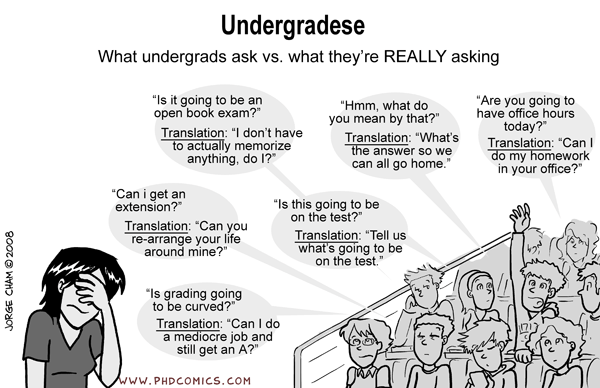As the semester winds down and everyone takes a breather after exams, it’s an excellent time to reflect on some of the tips and tricks to succeeding at university. As my good friend always told me,
there is no great secret!
1. Read the Course Outline
Every course begins with a course outline. In it, you will find all the gems of wisdom, including readings, assignments, and due dates (more on these below). Your professor has put in hours thinking about their course layout and design.
The easiest way to learn something about your professor is to read the outline. You’ll know what you need to prepare every week for the entire course, when the busy sections will be, and perhaps find ‘low hanging fruit’. Asking questions to your professor about course layout that is clearly in the outline sets a bad tone. However, asking a ‘clarifying’ question, such as ‘Question 1-4 are to be prepared in week 4. Will you be using them as material for class discussion or collecting them?’ immediately shows off your attention to detail. Yup – impression management…
2. Go to Class
Really. No, really!
Yes, professors rarely take attendance. However, material covered in class most often appears on exams. Techniques used to solve problems, approaches for case work, or simply how your professor is looking for an argument to be fully developed all come out in class. Students who attend and actively participate do better and have less stress. Note that this normally works best when you have your reading and prep work done before class; however, attending class unprepared is better than not attending class.
Hints, tips and tricks (not to mention changes in assignments, topics, and due dates!) are also all delivered in class; as it’s the scheduled meeting place, this changes do not need to be announced anywhere else.
3. Listen to your Professor
Professors can’t help but stress certain pieces of material or provide examples that naturally show up on evaluations. They passively tell you how we structure questions, what material to focus on, and which is less important to your immediate success.
Most importantly, we tell you what we expect. If you’re told to submit a 4 page paper on topic XYZ, double spaced with 6 references, it means that a strong paper cannot be accomplished in 1.5 pages (not enough detail) and that 10 pages is too much (don’t pad your work), that some research is required to support your arguments and that you need to leave space to written feedback within your document.
If your prof is clear about their expectations, you should work on meet / exceeding them. Your single spaced, 20 page paper might be the greatest written work ever, but when your prof has 100 papers to grade, you’re just annoying the person grading your work.
4. Complete ALL of the required readings
They’ve been assigned for a reason. Look for this material on exams and as expected referencing within your assignments. More and more, professors are moving away from traditional readings and selecting articles, stories, and other forms of media that provide a base of knowledge that you can then apply in your work. Use the information and demonstrate that you have engaged with the readings as often as you can.
And really, you had to expect some reading…
5. Do ALL of the Assignments & Tests
It never ceases to amaze me the number of students who miss tests or fail to submit assignments. It all adds up – not handing in work is just bad math! I have had students say to me that they didn’t submit that paper worth 15% of their grade because it was still wrong and not ‘up to their standards’. Ok, basic logic says that getting a D+ on a poorly written paper is still better than a zero.
And to deal in advance with the question of ‘Is there anything I can do to bring up my mark?’ typically asked by students with outstanding work, the answer is almost always “Plan better next time’.
If you hand in all of the assignment work at a reasonable level, you pass the course. Worry about perfect later.
6. Treat Due Dates as Non-Negotiable
Write out all of your due dates in one big, semester-length calendar as soon as you receive your course outlines (I told you they were handy!) and then move them all up one week. Yes, you’ll front load your first few weeks, but this is typically the time without many projects and tests. This way, you’ll be early on all of your work, have a built in buffer zone in case ‘life’ happens, and likely have more time available at the end of semester to focus on exam prep.
7. Play Nice with Others
Most courses now include a large group component; to successfully navigate group work, you need to work well with others. Step up as the team leader or group manager. Maintain influence in your group’s direction and progression. Listen and consider other people’s needs, motivations, schedules, etc… Essentially, treat people better than you would want to be treated.The investment in people will be rewarded.
As the new semester begins, I’ll post up some survival skills in time management, classroom management, and other topics!
Good luck and good learning. WCM
